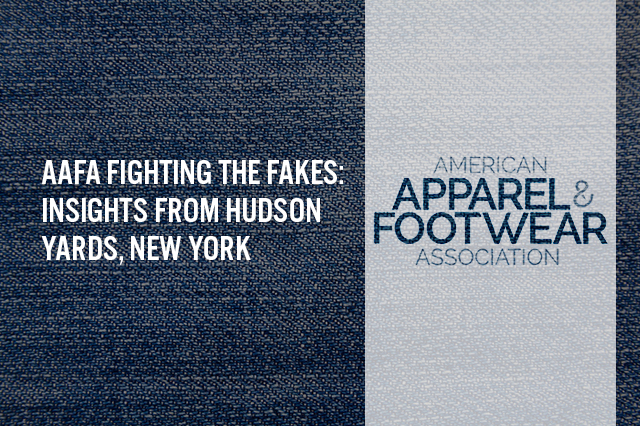
Nitheesh NH
The Coresight Research team attended and participated in the American Apparel & Footwear Association’s Brand Protection Seminar held at the iconic Tapestry headquarters in New York’s recently opened Hudson Yards on July 11.
Designed to address issues around intellectual property and brand protection, the seminar was a forum for thought leadership and idea exchange.
The Current Trade Climate and its Impact on IPR
We heard Steve Lamar, Executive Vice President, American Apparel & Footwear Association (AAFA), talk about how US-China trade discussions could impact intellectual property (IP) protection. If the US is successful, it could secure promises of greater IP protection in China, but in the meantime managing the issue could become more complex as sourcing spreads to multiple other countries to avoid punitive tariffs, meaning the IP protection effort also spreads across more jurisdictions.
We also heard thought leaders from brands such as Red Wing Shoe Company, DHL Express,
Tapestry and Yellow Brand Protection talk about the challenges posed by the steady growth of online, international commerce. The panel revealed how various components of the supply chain – brands, shippers and service providers — can leverage their expertise and work together on proactive solutions.
Platforms: Trends and Risks
Coresight Research CEO and Founder Deborah Weinswig presented on how companies can leverage platforms most effectively – looking at the many benefits they offer but also some of the caveats.
There’s little doubt about the importance of online platforms: The value of global e-commerce is expected to grow from about $1.4 trillion in 2017 to $2.8 trillion by 2022, a CAGR of 14.9%. E-commerce as a percent of total retail sales in the US has grown at a CAGR of 10.2% since 2013 and accounted for 9.9% of total US retail in the last quarter of 2018.
In addition to selling products, platforms can help brands and retailers boost loyalty, localize product offerings, better engage with customers, glean greater customer insights than would otherwise be possible, offer features such as gamification – and promise huge sales boosts via shopping festivals.
In 2018, Amazon Prime Day was estimated to have generated about $3.9 billion in sales. But that pales in comparison to Alibaba’s Singles Day sale, which last year racked up some $30.8 billion in sales, up 22% over the prior year.
Online platforms can be especially useful for brands looking to enter the China market without having to make a huge upfront investment in a brick-and-mortar presence. Online platforms offer rapid access to a huge market that is growing quickly – and that eagerly embraces online and mobile shopping in all its forms.
But, there are caveats. Brands lose some control when they go online via a third-party platform. Brands may face restrictions on pricing – especially during shopping festivals. Platforms may also introduce their own private-label brands that compete with branded products. And of course, there is the ever-present concern about the integrity of some products sold online.